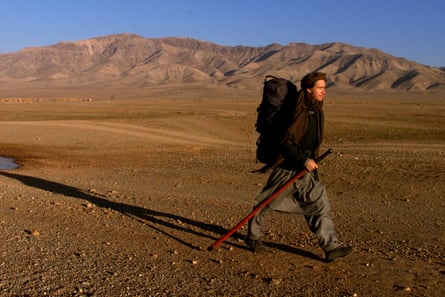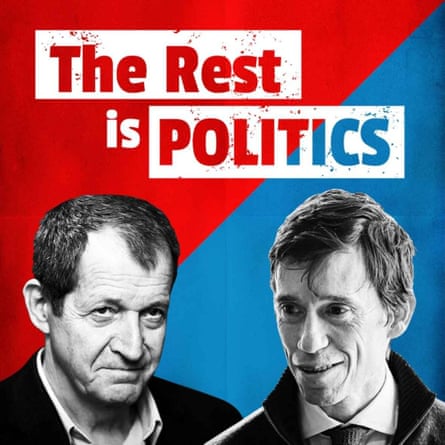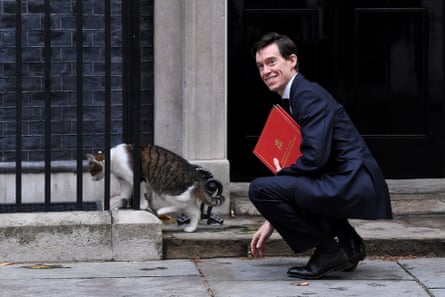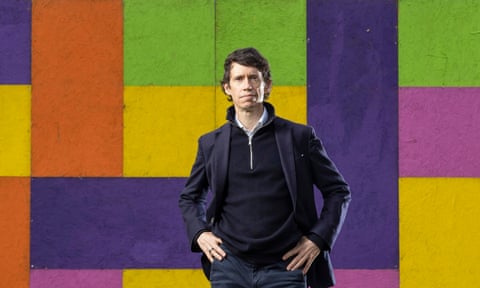Rory Stewart has long been a man out of time. At three, he named his rocking horse Bucephalus, after Alexander the Great’s famed steed. At six, he was reading Jane Austen. At 29, he walked across rural Afghanistan, dodging Taliban fighters, to emulate the derring-do of the 18th-century explorers he grew up idolising. At 30, he was made deputy governor of Maysan province during the Iraq war, effectively serving as the modern equivalent of a colonial administrator. “I always wanted to try to live a life that would feel like a storybook,” the former Conservative MP muses on a video call from New York.
Only now, at 49, is Stewart plunging into the zeitgeist, as a hit podcaster. The Rest Is Politics, which he presents with the former Labour spin doctor Alastair Campbell, regularly tops the UK podcast charts. He has found an unlikely following among liberal-leaning politics fans who would typically shun anything to do with an ex-Tory cabinet minister, but give Stewart a pass because of his willingness to excoriate Boris Johnson and share juicy titbits of Conservative party gossip.
“I came into it not really knowing what I was doing,” says Stewart. “And it’s been a surprisingly strange and painless experience. We just sit down for an hour and chat. It’s slightly bizarre that anyone wants to listen to this.” Tieless in an open-necked white shirt, Stewart speaks in full sentences, occasionally grimacing when asked a knotty question. He characterises Campbell and himself as “centrist dads” who talk about politics, albeit centrist dads who complain about being exhausted from all their international travel, pull in guests including the Labour leader Keir Starmer and reminisce about their encounters with world leaders.
The son of a spy and former colonial official, Stewart was born in Hong Kong, although his family hails from Perth and Kinross and he spent much of his childhood in Kensington (he once jokingly described himself as “lower-upper-middle class”). He was sent to boarding school in Oxford at eight, then attended Eton. “It made me very bad at dealing with women,” he says. “I was in an all-male environment until I was 18. It took me a long time to learn anything about British society. These schools are like islands floating in the sea. They have no connection. You might as well be in a space camp.”

He spent five months as a soldier in the Black Watch after finishing school, before studying at Oxford, where he attended a single meeting of the Bullingdon Club, the notorious all-male dining club whose members have included Boris Johnson and David Cameron. “It seemed to be an extreme statement of a very unpleasant vision of a class system that was completely undignified,” he recalls. “I thought it was unpleasant. I thought people should be ashamed of that kind of stuff.”
After university, he worked for the Foreign Office – or MI6, depending on whom you believe – in the Balkans, before taking an extended leave of absence to travel extensively across the Middle East. He returned to the Foreign Office after the invasion of Iraq in 2003, publishing a memoir of his time there in 2006. Occupational Hazards details Stewart’s growing disillusionment with the war. Initially supportive, he came to realise the folly of the coalition’s activities in the country. At times, the memoir reads like black farce, with Stewart dispensing bundles of cash to corrupt local officials, failing to mediate between warring factions and almost dying in a siege of his compound. “I think the basic problem with Iraq is that people simply didn’t understand what they were doing,” he says now. “They had a fantasy in their minds of a country that didn’t exist.”
Is it strange to be doing a podcast with one of the architects of the Iraq war? “I interviewed him a couple of years ago, when I was thinking of setting up my own podcast, but I never released it,” Stewart says. “The entire hour was me trying to talk about what it was like on the ground in Iraq, trying to understand what he thought was happening and why he’d signed up for this.” He says he has been encouraging Campbell to read Occupational Hazards.
Stewart draws a parallel between his concerns about Iraq and the unease a Labour supporter such as Campbell might feel towards him as a former Conservative politician. “There’s the anxieties that I and, I guess, people who agree with me would have about things like the Iraq war,” Stewart says. “And then there is, for him, the other side of it, which is that he’s got many listeners and friends and supporters who think that Tories are evil and will be equally horrified by my voting record.”
He sees the podcast as a way to reconcile people with opposing points of views in a spirit of robust debate. “I genuinely feel a lot of admiration and respect and fondness for him, and I think and hope that’s reciprocated,” says Stewart. These are noble sentiments in our polarised times, but I wonder whether such magnanimity is possible only when you haven’t suffered devastating loss as a result of either person’s decision-making: no airstrikes on your home; no relatives made destitute by government cuts.
I also wonder whether Campbell and Stewart aren’t more ideologically aligned than they suggest. They are white, centrist Scottish men who have been booted out of their parties. Stewart lost the Conservative whip in 2019, after voting against the government to block a no-deal Brexit, and subsequently resigned from the party; Campbell was expelled from Labour the same year after admitting he voted Liberal Democrat in the European elections.
They are also doting family men, frequently mentioning their children on the podcast. Stewart is married to Shoshana, the CEO of a cultural heritage charity, Turquoise Mountain; they have two sons, aged seven and five. He delivered the firstborn, Alexander, on their bathroom floor, without medical assistance. “We were timing contractions and thought it was all fine,” Stewart says. “And suddenly the baby started to come. But I did it. I mean, obviously, my wife did it. She was remarkably calm about the whole thing.” The family lives in Jordan, where Turquoise Mountain has operations.

The Rest Is Politics recently hosted Starmer. “I was disappointed,” says Stewart. “There’s so much that I admired from a distance about him. I like the idea of him. What disappointed me was that he didn’t seem radical enough. I didn’t get what the big picture was. I got the impression of a likable, thoughtful, moderate guy, but I didn’t feel the radical ambition.” In general, he thinks that politicians, even former politicians, are too guarded to be interesting interviewees.
Stewart is one of Johnson’s most reliable antagonists, variously describing the soon-to-be ex-PM as “a monster”, “the best liar we’ve ever had” and “evil”. Now that Johnson has been deposed, will Stewart stop kicking him? “I think he is dangerous and there are people out there who want him to come back,” Stewart says. “I think we need to remind people why he left. He should have gone much, much earlier. What he did was deeply, deeply shameful – and dangerous.” He thinks Johnson will attempt to return to frontbench politics. “He’s trying to do an Imran Khan or a Berlusconi. He’s going to be hovering around, hoping for a populist return.”
On The Rest Is Politics, Stewart is noticeably less critical of Rishi Sunak than Liz Truss, although he stops short of expressing support for either. He expresses his tentative hopes that a Truss premiership might finally spell the end of the Conservative party’s long march to the right. “I hope that what we have next is a coalition, and through that accomplish a change to our electoral system,” he says. “I think that’s really important to the country.”
When he was in frontline politics – first as an MP, then as a minister for the environment, international development, Africa and prisons before becoming secretary of state for international development – Stewart represented a now defunct tribe of centrist Tories. He regrets that the party’s lurch to the right has displaced politicians of his ilk. “There is an enormous gaping hole in the centre ground,” Stewart says. “There is a constituency for moderate, centre-right Conservatives who can embrace the environment, climate, gender, race, social justice, doing much more on poverty, much more on social care, much more on prisons, but also be fiscally responsible.”
Stewart’s problem has long been that he is the acceptable face of Conservatism for people who don’t vote Conservative. “That was something when I ran for the leadership against Boris Johnson [in 2019],” he says, sighing. “Everyone said: ‘The problem with this guy is that he’s the favourite for everybody who would never vote Conservative.’” But Stewart very much was a Conservative – something that leftwing followers of The Rest Is Politics might discover to their horror were they to check his voting record. As an MP, Stewart voted in favour of a stricter asylum system, raising tuition fees, introducing the bedroom tax and cutting welfare benefits.
Stewart has defended his voting record by pointing out that MPs have to vote with their parties to retain the whip, which can sometimes mean voting in support of measures they do not agree with. Are there any votes he particularly regrets? He pauses for a long time. A characteristic grimace. “I think we got austerity wrong,” he says, finally. “I realised in the departments I went into, most dramatically in prisons, that these cuts were close to insane. They had removed so many prison officers, while allowing the prison population to go up, that violence tripled in five years. All the windows were broken in Liverpool prison and couldn’t be fixed.”
Stewart’s best quality is that he engages with criticism, chewing over questions and working out a response, rather than shutting down or becoming evasive. But this is also the quality that rendered him ill-suited for the snake pit of coalface politics. “Thinking out loud is not always useful,” he says. “There are times to be discreet and thoughtful.” His honesty can be a problem – as in 2020, when he was running for mayor of London and admitted to sharing bathwater with his wife and children. “Most people were completely disgusted,” he says, chuckling. “But there was a fringe kind of grungy ecowarrior that quite liked that.”

During his campaign to become Tory leader, meanwhile, he revealed that he had once smoked opium at a wedding in Iran. “That was not very helpful,” he says, suddenly serious. “I was trying to launch my social-care policy in an interview with the Telegraph and I got zero lines on my social-care policy. All I got was three days of headlines saying I was a morally irresponsible drug user who would never be allowed to visit the US because I hadn’t declared on my immigration form that I’d used drugs.”
One of the slips he most regrets took place shortly after he was elected as the MP for Penrith and the Border in 2010. Stewart referred to areas in his constituency as “pretty primitive; people holding up their trousers with bits of twine, that sort of thing”. Now, he says: “I had everyone saying: ‘This shows he’s an out-of-touch toff.’ The BBC were asking me on air whether I was going to resign. I felt worse than I’d ever felt in my life. I felt I completely betrayed my constituents, that everything I’d done in politics was meaningless, that everything was destroyed, that my life was worthless.”
After leaving parliament, Stewart became a fellow at Yale, teaching politics and international relations. He doesn’t miss being a politician. “I found that it was very, very bad for me, for my personality type,” he says. “It brings out the worst in me. I thought it was bad for my brain, my body, my soul. I became anxious. I didn’t like myself. I really hated the fact that I would end up on the one hand being critical of party leaders and on the other hand creeping up to them and being superpolite to them, hoping I was going to get a job, and then I’d really hate myself.”
Even Stewart’s detractors would concede that he is thoughtful and intellectually impressive, with a deep understanding of foreign affairs drawn from his travels through the Middle East, as well as his time in the Balkans in his 20s. (They might also point out that Stewart benefited from one of the most expensive educations that money can buy.) On a number of big judgment calls, he got it right, whether it was calling for a Covid lockdown in early March 2020, when the government was paralysed by indecision, or warning of the dangers of Russian aggression in 2015. He fears that we are going into “a much deeper economic recession than people realise. I think there’s a 40% to 50% chance we could be entering a 10-year recession in Europe.”
But there are aspects of Stewart’s career that raise uncomfortable questions. Although he subsequently became disillusioned with the Iraq war, that does not change the fact that he volunteered to run a large swathe of the country at the age of 30, as part of an unelected occupying force. Then there is Stewart’s walk across Afghanistan, which he documented in his 2004 bestseller The Places in Between. Stewart effectively threw himself upon the generosity of impoverished communities during his solo walk across remote, mountainous regions in the depths of winter. He occasionally shouts at villagers in hunger and frustration when they refuse to take him in, and gripes about the quality of the food some offer him.
Should Stewart – a privileged western outsider – have relied upon the goodwill of people with so much less than him in his pursuit of an enriching cultural experience? “That’s right,” he says. “I did actually, in those houses, leave money for people. I would hide it behind a cushion, because people wouldn’t take money off me. So, in purely financial terms, technically, people were better off after I’d stayed than not.

“But you’re absolutely right. There’s something very odd about what’s happening there. I’m completely dependent on them. They’re keeping me alive. They’re feeding me. And I’m benefiting incredibly from that culture of generosity. It’s an extraordinary privilege to be able to do that. And it’s not a culture of generosity that was created to allow some young English person to have an exciting adventure.”
But it is also worth pointing out that Stewart includes these unflattering passages in his book; many writers would probably have left them out. And he does appear sincerely committed to improving the lives of poorer communities. He is about to start a new job as the CEO of GiveDirectly, a nonprofit that allows donors to send money directly to the poorest people in eight African nations and Yemen.
“There’s just a fundamental problem with development, which is that it involves outsiders, often foreigners, deciding what’s good for you,” Stewart says. Direct cash transfers empower impoverished communities. “The idea is that it’s their dignity, it’s their choice on what they do. Typically, people will fix their house, buy a cow, manure for the fields, connect to electricity, dig a latrine, sign up to government health insurance. It’s amazing, the transformation to people’s lives, with quite a small amount of financial assistance.”
Still in his 40s, Stewart has already lived many lives: as an award-winning writer, a cabinet minister, a podcaster, an academic, a soldier and a diplomat. Now comes another ambitious challenge. “I think we have a chance of ending extreme poverty worldwide,” he says, absolutely impassioned. “I can lead a movement starting in Africa that can demonstrate in a couple of countries how it could be done.”
And after Stewart ends world poverty? “I’d like to take a camel from Morocco to Timbuktu,” he says.
The Rest Is Politics is available now
